初中英语频度副词
初中英语语法专题 频度副词 优质课

以下是每个学生乘公交车上学的频率
Mon. Tues. Wed. Thurs. Fri. 频 率
Millie √ √ √ √ √ always Sandy √ √ √ √ × usually Simon √ √ √ × × often David √ √ × × × sometimes Kitty √ × × × × seldom Daniel × × × × × never
He
每个周末 every weekend
每年两次 twice a year
每周三次 go to the cinema
three times a week
如何对频度副词提问?
1. I often play football.
_______
How often do you play football? 2. She _s_e_l_d__o_m__ watches TV.
次数+ 日、周、月、年…
一天一次
once a day
一周两次 一月三次
twice a week three times a month
一年四次 four times a year
} once/twice
+day/week/month
初中英语副词的用法

副词(adverb,简写为adv)是一种用来修饰动词、形容词、全句的词,说明时间、地点、程度、方式等概念的词。
副词是一种半虚半实的词。
副词可分为:地点副词、方式副词、程度副词、疑问副词和连接副词。
副词连用顺序:程度副词+方式副词+地点副词+时间副词。
副词[adverb] 起修饰或限制动词或形容词作用、表程度或范围的词。
1) 时间和频度副词:now,then,often,always,usually,early,today, late,next,lastday,already,generally,frequently,seldom,ever,never,yet,soon,too, immediately, finally,shortly, before, ago,sometimes, yesterday. once,twice2) 地点副词:here, there, everywhere, anywhere, in, out, inside, outside, above, below, down, back, forward, home, upstairs, downstairs, across, along, round , around, near, off, past, up, away, on.3) 方式副词:carefully, properly, anxiously, suddenly, normally, fast, well, calmly, politely, proudly, softly, warmly4) 程度副词:much,little, very,rather,so,too,still, quite, perfectly, enough, extremely, entirely,almost, slightly, hardly.5) 疑问副词:how, when, where, why.6) 关系副词:when, where, why.7) 连接副词:therefore,moreover,however,otherwise,then.副词在句中可作状语,表语,补语,定语。
初中英语频度副词微课教案

初中英语频度副词微课教案1. 学生能够理解频度副词的概念及用法。
2. 学生能够在句子中正确使用频度副词。
3. 学生能够运用频度副词描述日常生活中的一贯行为或习惯。
二、教学重难点1. 频度副词的用法。
2. 如何在句子中正确放置频度副词。
三、课前准备1. 教学课件。
2. 相关练习题。
四、教学过程Step 1: 导入通过向学生提问,引导他们思考日常生活中的一些习惯或行为,例如:“Do you like apples? Do you eat them every day?”,从而引入频度副词的概念。
Step 2: 讲解频度副词1. 向学生介绍频度副词的定义及用法,例如:always, usually, often, sometimes, rarely, never等。
2. 通过示例句子,讲解频度副词在句子中的位置,如主语+频度副词+动词原形+其他。
Step 3: 互动练习1. 让学生分组,每组选择一个频度副词,如always, usually, often等。
2. 每组轮流用所选频度副词造句,描述一个人的习惯或行为。
3. 其他组成员判断所造句子的正确性。
Step 4: 游戏环节设计一个游戏,让学生通过卡片抽取频度副词,并用所抽到的频度副词完成句子。
游戏过程中,教师可适时给予指导和纠正。
Step 5: 总结与拓展1. 让学生总结今天所学的内容,即频度副词的定义、用法及位置。
2. 鼓励学生运用所学知识,描述自己或他人的一贯行为或习惯。
3. 提示学生注意频度副词在否定句中的位置,如:I don't always go to school by bike.Step 6: 课后作业布置相关练习题,让学生巩固所学知识,提高运用频度副词的能力。
五、教学反思通过本次微课教学,学生应掌握频度副词的概念、用法及位置,并在实际语境中正确运用。
教师在教学过程中要注意观察学生的反应,及时给予指导和纠正,确保教学效果。
同时,课后作业的布置有助于巩固所学知识,提高学生的英语水平。
初中英语语法知识精讲:常用副词考法归纳6

初中英语语法知识精讲:常用副词考法归纳6英语副词的分类(1) 时间副词:常见的有now, then, soon, ago, recently, lately, later, before, early, today, tomorrow, yesterday, tonight, suddenly, immediately, still, already, just等。
如:An idea suddenly struck me.我心中忽然产生一个念头。
(2) 地点副词:常见的有here, there, up, down, away, nearby, home, ahead, abroad, indoors, overseas, upstairs, downstairs 等。
如:I am considering going abroad.我正在考虑出国。
(3) 方式副词:表示行为方式的副词大多以-ly结尾,常见的有quietly, heavily, warmly, carefully, happily, politely, angrily等。
如:Look at the picture carefully.仔细看这幅画。
(4) 频度副词:常见的有always, usually, often, frequently, constantly, occasionally, sometimes, seldom, hardly, rarely, never等。
Sometimes he gets up early.他有时起得早。
(5) 程度副词:常见的有fairly, pretty, rather, quite, very, much, too, greatly, almost, nearly, half, highly, deeply, partly, perfectly, really等。
如:The film was quite good.这个电影不错。
初中英语副词总结归纳大全
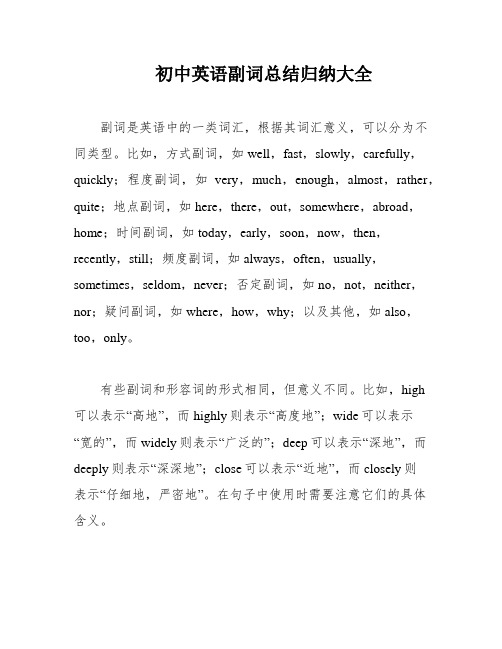
初中英语副词总结归纳大全副词是英语中的一类词汇,根据其词汇意义,可以分为不同类型。
比如,方式副词,如well,fast,slowly,carefully,quickly;程度副词,如very,much,enough,almost,rather,quite;地点副词,如here,there,out,somewhere,abroad,home;时间副词,如today,early,soon,now,then,recently,still;频度副词,如always,often,usually,sometimes,seldom,never;否定副词,如no,not,neither,nor;疑问副词,如where,how,why;以及其他,如also,too,only。
有些副词和形容词的形式相同,但意义不同。
比如,high可以表示“高地”,而highly则表示“高度地”;wide可以表示“宽的”,而widely则表示“广泛的”;deep可以表示“深地”,而deeply则表示“深深地”;close可以表示“近地”,而closely则表示“仔细地,严密地”。
在句子中使用时需要注意它们的具体含义。
还有一些副词虽然形式不同,但意义相近。
比如,XXX表示“迟,晚”,而XXX则表示“最近”;hard表示“努力的,艰苦地”,而hardly则表示“几乎不”;just可以表示“刚刚,仅仅,恰好”,而justly则表示“公正地,正当地”;most可以表示“很,最”,而mostly则表示“主要地”,而almost则表示“几乎,差不多”。
最后,需要注意一些副词的区别。
比如,already用于肯定句中,表示“已经”,而yet用于否定句末,表示“还”,用于疑问句末,表示“已经”。
例如,“He had already left when I called.”(当我给他打电话时,他已经离开了。
)Have you found your ruler yet。
初中英语频度副词专题辅导
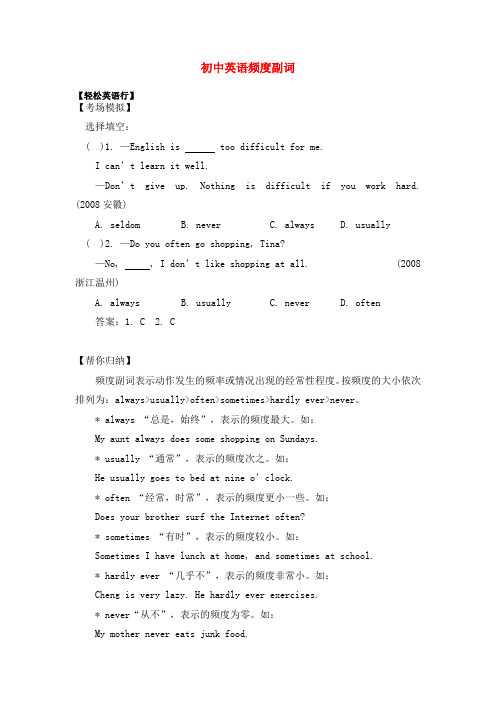
初中英语频度副词【轻松英语行】【考场模拟】选择填空:( )1. —English is too difficult for me.I can’t learn it well.—Don’t give up. Nothing is difficult if you work hard. (2008安徽)A. seldomB. neverC. alwaysD. usually( )2. —Do you often go shopping, Tina?—No, , I don’t like shopping at all. (2008浙江温州)A. alwaysB. usuallyC. neverD. often答案:1. C 2. C【帮你归纳】频度副词表示动作发生的频率或情况出现的经常性程度。
按频度的大小依次排列为:always>usually>often>sometimes>hardly ever>never。
* always “总是,始终”,表示的频度最大。
如:My aunt always does some shopping on Sundays.* usually “通常”,表示的频度次之。
如:He usually goes to bed at nine o’clock.* often “经常,时常”,表示的频度更小一些。
如:Does your brother surf the Internet often?* sometimes “有时”,表示的频度较小。
如:Sometimes I have lunch at home, and sometimes at school.* hardly ever “几乎不”,表示的频度非常小。
如:Cheng is very lazy. He hardly ever exercises.* never“从不”,表示的频度为零。
如:My mother never eats junk food.。
初中英语常见的副词归纳
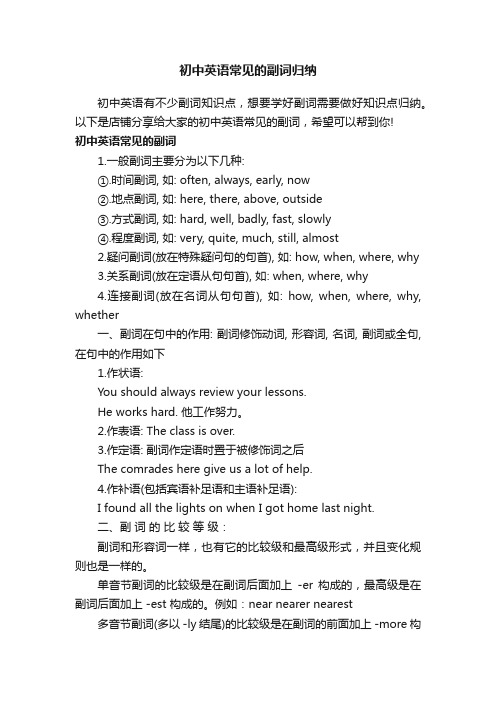
初中英语常见的副词归纳初中英语有不少副词知识点,想要学好副词需要做好知识点归纳。
以下是店铺分享给大家的初中英语常见的副词,希望可以帮到你!初中英语常见的副词1.一般副词主要分为以下几种:①.时间副词, 如: often, always, early, now②.地点副词, 如: here, there, above, outside③.方式副词, 如: hard, well, badly, fast, slowly④.程度副词, 如: very, quite, much, still, almost2.疑问副词(放在特殊疑问句的句首), 如: how, when, where, why3.关系副词(放在定语从句句首), 如: when, where, why4.连接副词(放在名词从句句首), 如: how, when, where, why, whether一、副词在句中的作用: 副词修饰动词, 形容词, 名词, 副词或全句, 在句中的作用如下1.作状语:You should always review your lessons.He works hard. 他工作努力。
2.作表语: The class is over.3.作定语: 副词作定语时置于被修饰词之后The comrades here give us a lot of help.4.作补语(包括宾语补足语和主语补足语):I found all the lights on when I got home last night.二、副词的比较等级:副词和形容词一样,也有它的比较级和最高级形式,并且变化规则也是一样的。
单音节副词的比较级是在副词后面加上-er 构成的,最高级是在副词后面加上 -est 构成的。
例如:near nearer nearest多音节副词(多以 -ly 结尾)的比较级是在副词的前面加上 -more 构成的。
最高级是在副词前面加上-most 构成的.例如;warmly more warmly most warmly有些副词的比较级和最高级形式是不规则的:well-better - best little - less - leastmuch- more - most badly - worse - worstfar-farther(further)-farthest(furthest)副词的比较级和最高级用法同形容词的比较级用法基本一样,两者比较用比较级,三者或以上用最高级,但是副词最高级形式句中the 可以省略。
初中英语频度副词

I usually watch TV at seven in the evening. • 三、如果句中含有情态动词或助动词,频度副词要放 在它们的后面。 He can often help you.sometimes还可放在句首或句尾。
频率副词
Adverbs of frequency
方正县大罗密镇学校 井旭红
一、“频度副词”:英语中always, usually, often, sometimes, seldom, never等,叫做频度副词。这 类词用来表示某一动作发生的频率,或某一状态 出现的频率,即在一定的时间内动作重复发生或 状态重复出现的次数。
How often do you write to your brother?
How often do you exercise?
I never play football with my friends, because I don’t lik所差别,但它们在句 中的位置却基本相同。 现将它们在句中的位置归纳如下: • 一、如果是to be句型,频度副词要放在to be的后面。
Adverbs of frequency
never seldom sometimes often usually always
0% 100%
二、频度副词的位置:
1. 在be动词之后。 She is sometimes very busy. 。
2. 在第一个动词或情态动词之后。如:
I will never forget the first time I met you. 3. 在实义动词之前。
初中英语语法精讲:常考副词用法归纳11
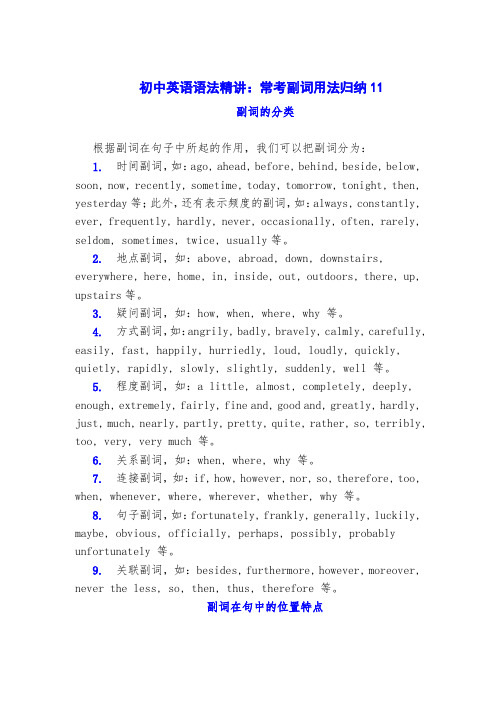
初中英语语法精讲:常考副词用法归纳11副词的分类根据副词在句子中所起的作用,我们可以把副词分为:1.时间副词,如:ago, ahead, before, behind, beside, below, soon, now, recently, sometime, today, tomorrow, tonight, then, yesterday等;此外,还有表示频度的副词,如:always, constantly, ever, frequently, hardly, never, occasionally, often, rarely, seldom, sometimes, twice, usually等。
2.地点副词,如:above, abroad, down, downstairs, everywhere, here, home, in, inside, out, outdoors, there, up, upstairs等。
3.疑问副词,如:how, when, where, why 等。
4.方式副词,如:angrily, badly, bravely, calmly, carefully, easily, fast, happily, hurriedly, loud, loudly, quickly, quietly, rapidly, slowly, slightly, suddenly, well 等。
5.程度副词,如:a little, almost, completely, deeply, enough, extremely, fairly, fine and, good and, greatly, hardly, just, much, nearly, partly, pretty, quite, rather, so, terribly, too, very, very much 等。
初中英语语法 频度副词的基本用法课件

Grammar focus 频度副词
1. 你通常在周未做什么? _W__h_a_t_ _d_o_ you u_s_u_a_l_ly_ do on weekends?
2. 我总是去运动。 I a_l_w__a_y_s e_x_e_r_c_is_e_. 3. 他们在周未做什么?
W__h_a_t__ _d_o_ they _d_o_ on weekends?
The End
Grammar focus 频度副词
7. 你多久去看电影一次? H__o_w__ o_f_t_en__ do you go to the m__o_v_i_e_s?
8. 我可能一个月去看一次。 I go to movies m__a_y_b_e_ _o_n_c_e_ a _m__o_n_t_h.
9. 他多久看一次电视? H__o_w_ _o_f_t_e_n_ does he watch TV?
12. 不,我从不去购物。 No, I _n_e_v_e_r___g_oshopping.
语法小贴士
对频率提问
1. how often 意为 “__多_久__一__次___”,是用于 提问表示 _频__率_ 的特殊疑问词组。其答 语应为表示 _频__率__ 的副词或副词词组。 句子的时态一般是_一__般__现_在__时__态___,也 可以是一般过去时。
3. When do your friends exercise?
They weekends.
exercise on
4. When does Scott go to work?
He
goes to work at eleven
o’clock. He’s never late.
根据你自己的情况用适当的频度副词回答问题.
初中英语知识点归纳常见的副词短语用法总结
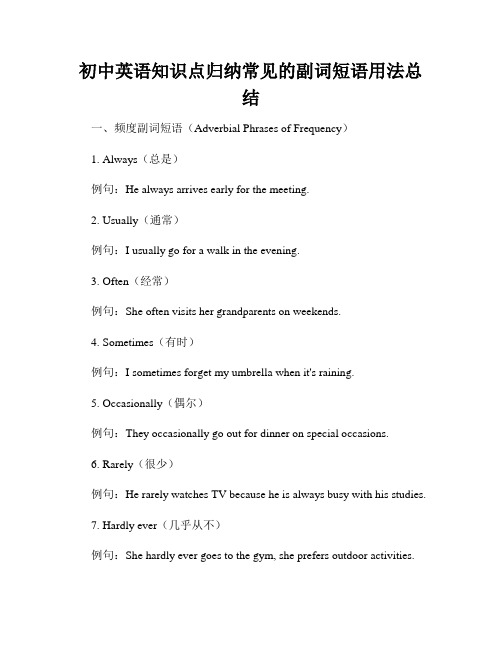
初中英语知识点归纳常见的副词短语用法总结一、频度副词短语(Adverbial Phrases of Frequency)1. Always(总是)例句:He always arrives early for the meeting.2. Usually(通常)例句:I usually go for a walk in the evening.3. Often(经常)例句:She often visits her grandparents on weekends.4. Sometimes(有时)例句:I sometimes forget my umbrella when it's raining.5. Occasionally(偶尔)例句:They occasionally go out for dinner on special occasions.6. Rarely(很少)例句:He rarely watches TV because he is always busy with his studies.7. Hardly ever(几乎从不)例句:She hardly ever goes to the gym, she prefers outdoor activities.8. Never(从不)例句:They never miss a chance to travel during summer vacation.二、时间副词短语(Adverbial Phrases of Time)1. In the morning/afternoon/evening(在早晨/下午/晚上)例句:I exercise in the morning before going to work.2. On weekdays/weekends(在工作日/周末)例句:I have to work on weekdays but I relax on weekends.3. At night(在晚上)例句:They like to stargaze at night in their backyard.4. By the end of(到...结束)例句:She will finish her project by the end of next week.5. In the meantime(与此同时)例句:While waiting for the bus, he read a book in the meantime.6. At the same time(同时)例句:They arrived at the party at the same time.7. From time to time(时常)例句:He visits his grandparents from time to time.8. All day/night long(整天/整晚)例句:They were dancing all night long at the party.三、地点副词短语(Adverbial Phrases of Place)1. In the park(在公园)例句:They often have picnics in the park on weekends.2. At school(在学校)例句:I met my friends at school during lunch break.3. On the beach(在海滩)例句:They love swimming and sunbathing on the beach.4. In the city/countryside(在城市/农村)例句:She enjoys the tranquility of living in the countryside.5. At home(在家)例句:He spends most of his weekends at home with his family. 6. On the way(在路上)例句:They had a great conversation on the way to the airport. 7. Across the road(在马路对面)例句:The supermarket is just across the road, it's very convenient.四、方式副词短语(Adverbial Phrases of Manner)1. In a hurry(匆忙地)例句:She left the house in a hurry because she was late for work.2. With pleasure(乐意地)例句:I will help you move next week, with pleasure.3. In a loud voice(大声地)例句:He shouted in a loud voice to get the attention of the audience.4. On purpose(故意地)例句:He spilled the drink on purpose to annoy his sister.5. By accident(偶然地)例句:I found this lost wallet by accident while walking in the park.6. In a funny way(滑稽地)例句:He imitates his teacher in a funny way and makes everyone laugh.7. In a serious manner(严肃地)例句:The teacher spoke to the students in a serious manner about their behavior.总结:副词短语在英语中起到修饰动词、形容词、副词和整个句子的作用,能够更准确地表达出时间、地点、方式和频率等信息。
初中英语副词知识点:副词作状语时在句子中的位置

初中英语副词知识点:副词作状语时在句子中的位置初中英语副词知识点:副词作状语时在句子中的位置作状语:①时间副词:一般放在句首或句尾,注意,early、late、before、later、yet等一般放在句尾,already、just一般放在动词的前面。
如:We will visit the Great Wall tomorrow.(我们明天要去参观长城) / They have already been to the UK twice.(他们去过英王国两次) / Soon the lost boy found his way back home.(不久迷路的孩子找到了回家的路)②频度副词:一般放在be动词之后或者助动词与主要动词之间,但sometimes、often 等还可以放在句首或句尾,usually可放在句首,once可放在句尾,twice、three times等一般放在句尾。
如:Sometimes I get up early.(我有时起得早)/ The workers usually have lunch at the factory.(工人们通常在厂里吃午饭) / Take this medicine twice a day.(这种药一天吃两次)③方式副词:一般放在行为动之后,suddenly可以放在句首、句尾或动词之前。
如:Old people can hardly walk as quickly as young people.(老年人几乎不可能走得和年轻人一样快) / Suddenly he saw a light in the dark cave(山洞).(突然,在黑黢黢的山洞里,他看见了一丝亮光)④地点副词:一般放在句尾,但here、there还可放在句首。
如:There you can see thousands of bikes running in all directions(方向).(在那里,你可以看到成千上万的自行车朝各个方向流动) / The frightened wolf ran away.(受到惊吓的狼逃开了)/ He walked out quietly and turned back soon.(他悄悄地走了出去,很快又返回)⑤程度副词:修饰动词时,放在动词之前;修饰形容词或副词时,放在形容词或副词之前。
频度副词用法
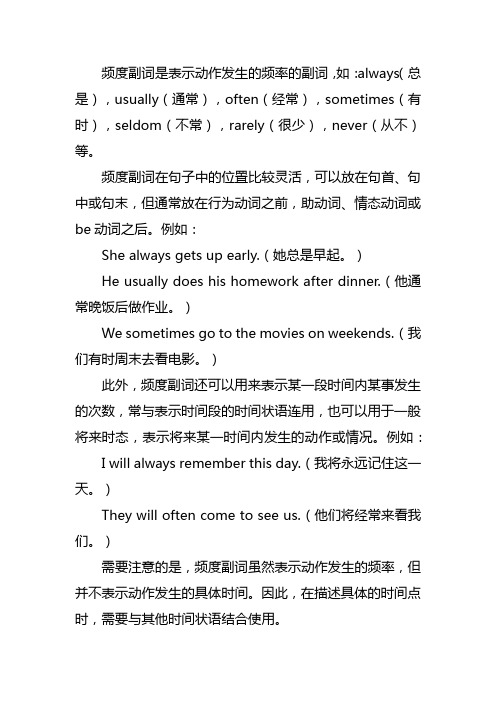
频度副词是表示动作发生的频率的副词,如:always(总是),usually(通常),often(经常),sometimes(有时),seldom(不常),rarely(很少),never(从不)等。
频度副词在句子中的位置比较灵活,可以放在句首、句中或句末,但通常放在行为动词之前,助动词、情态动词或be动词之后。
例如:
She always gets up early.(她总是早起。
)
He usually does his homework after dinner.(他通常晚饭后做作业。
)
We sometimes go to the movies on weekends.(我们有时周末去看电影。
)
此外,频度副词还可以用来表示某一段时间内某事发生的次数,常与表示时间段的时间状语连用,也可以用于一般将来时态,表示将来某一时间内发生的动作或情况。
例如:
I will always remember this day.(我将永远记住这一天。
)
They will often come to see us.(他们将经常来看我们。
)
需要注意的是,频度副词虽然表示动作发生的频率,但并不表示动作发生的具体时间。
因此,在描述具体的时间点时,需要与其他时间状语结合使用。
总之,频度副词是英语中常用的副词之一,掌握其用法可以帮助我们更准确地表达动作发生的频率和时间。
初中英语语法课件 频度副词的用法

3)often的频率比usually又略低些,约为60%-70%,意 思是"经常"、"常常"。 Do you often write to them? 你常给他们写信吗? Does Fred come here often? 弗雷德常来这儿吗?
4)sometimes的频率比often又低些,约为50%> sometimes>30%,意思是“有时、不时”。 Jenny usually eats a sandwich for lunch. Sometimes she eats soup. 珍妮经常午饭吃一个三明治。但她有时候喝汤。
5)never与always完全相反,是100%否定,意思是 “从不,决不,绝不,总是不“。 I can never stop. 我绝不会停止。 Li Ming never wears dresses. 李明从不穿裙子。
频度副词的位置
通常频率副词放在实义动词之前, be动词,情态动词或助动词之后。但 是sometimes最活跃。它既可以在句 中也可以在句首,还能在句末。
hardly与hard的区别
hardly hard
副词,意为“几乎不;几乎没有”,本身含有否定 意义,不能与其他表示否定的词连用。
既可作形容词,意为“硬的;困难的;艰苦的”, 也可作副词,意为“努力地;猛烈地”。
例: Lucy hardly ate anything. 露西几乎什么都没吃。 The ice is hard enough to skate on. 这冰很硬,可以在上面滑。
never的频度是0,意为“从来不;永不”。
频度副词经典例句
1) always表示的频率为100%,意思是"总是、一直、 始终"。 I always do my cleaning on Sundays. 我总是在星期天打扫卫生。
初中英语常用频度副词的用法微课

I go to the gym sometimes.
Complete the report .
Activities
Days a year
exercise
365
read books
365
r Jane is a 16-year-old high school student watch TV for 320
hardly
never
Complete the report .
Activities
Days a year
exercise
365
read books
365
r Jane is a 16-year-old high school student watch TV for 320
in the United States. American Teenager over 2 hours
______ goes to the dentist for teeth
cleaning. She says she is afraid!
Jane
Analyze the information in the chart .
ActiviExercise
365
Read books
Sun. Mon. Tues. Wed . Thurs. Fri. Sat.
√√
√
He dances three times a week.
He sometimes(有时) dances .
How often do they...?
Sun. Mon. Tues. Wed . Thurs. Fri. Sat.
has some bad habits, too. She _______
初中英语频度副词
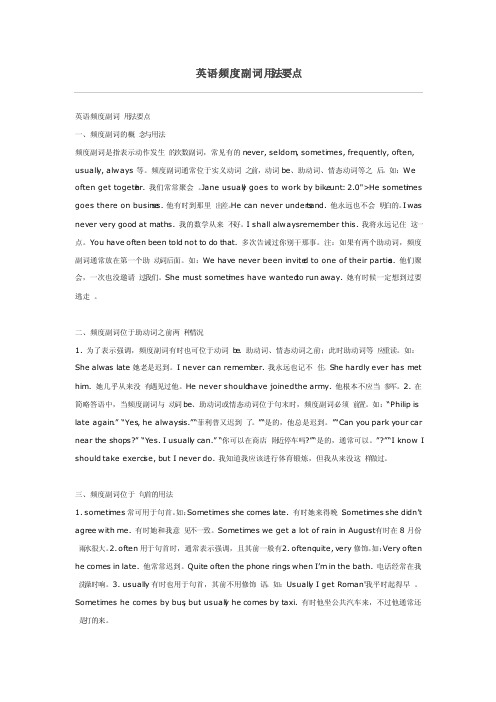
英语频度副词用法要点英语频度副词用法要点一、频度副词的概念与用法频度副词是指表示动作发生的次数副词,常见有的never, seldom, sometim es, frequen tly, often, usually, always等。
频度副词通常位于实义动词之前,动词be、助动词、情态动词等之后。
如:We often get togethe r. 我们常常聚会。
Jane usually goes to work by bike. unt: 2.0">He sometim es goes there on busines s. 他有时到那里出差。
He can never underst and. 他永远也不会明白的。
I was never very good at maths. 我的数学从来不好。
I shall alwaysremembe r this. 我将永远记住这一点。
You have often been told not to do that. 多次告诫过你别干那事。
注:如果有两个助动词,频度副词通常放在第一个助动词后面。
如:We have never been invited to one of their parties. 他们聚会,一次也没邀请过我们。
She must sometim es have wantedto run away. 她有时候一定想到过要逃走。
二、频度副词位于助动词之前两种情况1. 为了表示强调,频度副词有时也可位于动词b e、助动词、情态动词之前;此时助动词等应重读。
如:She alwas late她老是迟到。
I never can remembe r. 我永远也记不住。
She hardlyever has met him. 她几乎从来没有遇见过他。
2022初中英语知识点复习频度副词
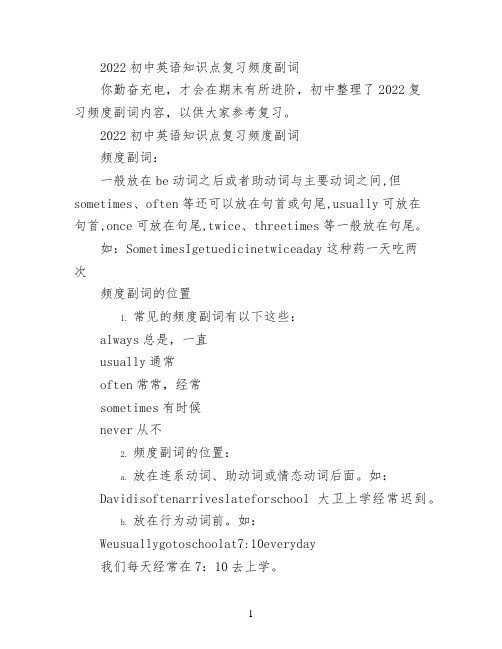
2022初中英语知识点复习频度副词
你勤奋充电,才会在期末有所进阶,初中整理了2022复
习频度副词内容,以供大家参考复习。
2022初中英语知识点复习频度副词
频度副词:
一般放在be动词之后或者助动词与主要动词之间,但sometimes、often等还可以放在句首或句尾,usually可放在
句首,once可放在句尾,twice、threetimes等一般放在句尾。
如:SometimesIgetuedicinetwiceaday这种药一天吃两
次
频度副词的位置
1.常见的频度副词有以下这些:
always总是,一直
usually通常
often常常,经常
sometimes有时候
never从不
2.频度副词的位置:
a.放在连系动词、助动词或情态动词后面。
如:
Davidisoftenarriveslateforschool大卫上学经常迟到。
b.放在行为动词前。
如:
Weusuallygotoschoolat7:10everyday
我们每天经常在7:10去上学。
c.有些频度副词可放在句首或句尾,用来表示强调。
如:
SometimesIwalhome,sometimeIrideabie
有时我步行回家,有时我骑自行车。
放在句首时,主语、谓语动词要倒装。
如:
NeverhaveIbeenthere我从没到过那儿。
上述是2022初中英语知识点复习频度副词内容,希望帮助大家复习。
更多精彩内容,尽请关注!。
初中英语副词总结归纳大全
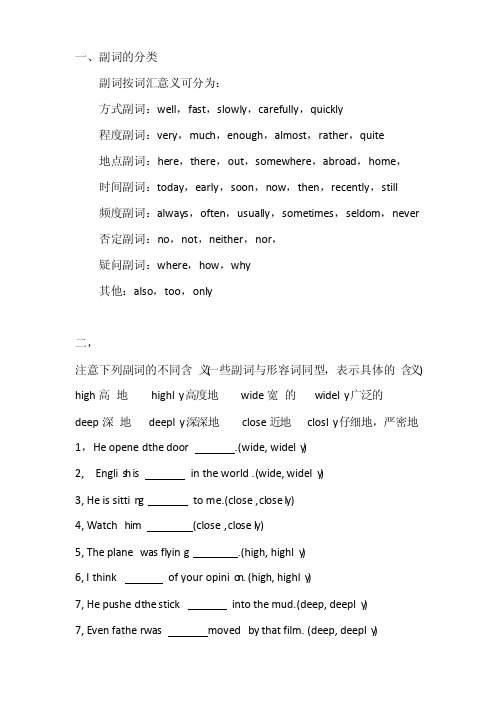
一、副词的分类副词按词汇意义可分为:方式副词:well,fast,slowly,carefu lly,quickl y程度副词:very,much,enough,almost,rather,quite地点副词:here,there,out,somewh ere,abroad,home,时间副词:today,early,soon,now,then,recent ly,still频度副词:always,often,usuall y,someti mes,seldom,never否定副词:no,not,neithe r,nor,疑问副词:where,how,why其他:also,too,only二,注意下列副词的不同含义(一些副词与形容词同型,表示具体的含义) high高地highly高度地wide宽的widely广泛的deep深地deeply深深地close近地closly仔细地,严密地1,He opened the door .(wide, widely)2, Englis h is in the world. (wide, widely)3, He is sittin g to me.(close, closel y)4, Watchhim (close, closel y)5, The plane was flying .(high, highly)6, I thinkof your opinio n. (high, highly)7, He pushed the stickinto the mud.(deep, deeply)7, Even father was movedby that film. (deep, deeply)两种形式的副词含义迥异。
late迟,晚lately最近hard努力的,艰苦地hardly几乎不just刚刚,仅仅,恰好justly公正地,正当地most很,最mostly主要地almost几乎,差不多三,其它副词比较:1, alread y与yet的区别al ready用于肯定句句中,表示“已经”;yet用于否定句句末,表示“还”,用于疑问句句末,表示“已经”例如,He had alread y left when I called.当我给他打电话时,他已经离开了。
- 1、下载文档前请自行甄别文档内容的完整性,平台不提供额外的编辑、内容补充、找答案等附加服务。
- 2、"仅部分预览"的文档,不可在线预览部分如存在完整性等问题,可反馈申请退款(可完整预览的文档不适用该条件!)。
- 3、如文档侵犯您的权益,请联系客服反馈,我们会尽快为您处理(人工客服工作时间:9:00-18:30)。
英语频度副词用法要点
一、频度副词的概念与用法
频度副词是指表示动作发生的次数副词,常见有的never, seldom, sometimes, frequently, often, usually, always 等。
频度副词通常位于实义动词之前,动词be、助动词、情态动词等之后。
如:We often get together. 我们常常聚会。
Jane usually goes to work by bike. unt: 2.0">He sometimes goes there on business. 他有时到那里出差。
He can never understand. 他永远也不会明白的。
I was never very good at maths. 我的数学从来不好。
I shall always remember this. 我将永远记住这一点。
You have often been told not to do that. 多次告诫过你别干那事。
注:如果有两个助动词,频度副词通常放在第一个助动词后面。
如:We have never been invited to one of their parties. 他们聚会,一次也没邀请过我们。
She must sometimes have wanted to run away. 她有时候一定想到过要逃走。
二、频度副词位于助动词之前两种情况
1. 为了表示强调,频度副词有时也可位于动词be、助动词、情态动词之前;此时助动词等应重读。
如:She alwas late她老是迟到。
I never can remember. 我永远也记不住。
She hardly ever has met him. 她几乎从来没有遇见过他。
He never should have joined the army. 他根本不应当参军。
2. 在简略答语中,当频度副词与动词be、助动词或情态动词位于句末时,频度副词必须前置。
如:“Philip is late again.” “Yes, he always is.”“菲利普又迟到了。
”“是的,他总是迟到。
”“Can you park your car near the shops?” “Yes. I usually can.” “你可以在商店附近停车吗?”“是的,通常可以。
”?”“I know I should take exercise, but I never do. 我知道我应该进行体育锻炼,但我从来没这样做过。
三、频度副词位于句首的用法
1. sometimes常可用于句首。
如:Sometimes she comes late. 有时她来得晚。
Sometimes she didn’t agree with me. 有时她和我意见不一致。
Sometimes we get a lot of rain in August. 有时在8月份雨水很大。
2. often用于句首时,通常表示强调,且其前一般有2. oftenquite, very修饰。
如:Very often he comes in late. 他常常迟到。
Quite often the phone rings when I’m in the bath. 电话经常在我洗澡时响。
3. usually有时也用于句首,其前不用修饰语。
如:Usually I get Roman'我平时起得早。
Sometimes he comes by bus, but usually he comes by taxi. 有时他坐公共汽车来,不过他通常还是打的来。
Usually cooking pots have two small handles but pans have one long handle. 通常地深底煮锅有两只把手而平底锅只有一个长长的把手。
